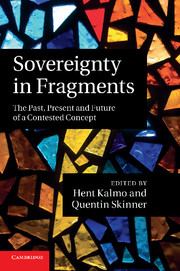Book contents
- Frontmatter
- Contents
- Notes on contributors
- Acknowledgements
- Introduction: a concept in fragments
- 1 The sovereign state: a genealogy
- 2 The apparition of sovereignty
- 3 The Westphalian myth and the idea of external sovereignty
- 4 Double binds: sovereignty and the just war tradition
- 5 The durability of organized hypocrisy
- 6 A matter of fact? The many faces of sovereignty
- 7 The survival of sovereignty
- 8 Sovereignty and after
- 9 Prolegomena to the post-sovereign Rechtsstaat
- 10 Sovereignty beyond the state
- 11 Sovereignty between government, exception and governance
- 12 Conclusion: vocabularies of sovereignty – powers of a paradox
- Bibliography
- Index
10 - Sovereignty beyond the state
Published online by Cambridge University Press: 04 February 2011
- Frontmatter
- Contents
- Notes on contributors
- Acknowledgements
- Introduction: a concept in fragments
- 1 The sovereign state: a genealogy
- 2 The apparition of sovereignty
- 3 The Westphalian myth and the idea of external sovereignty
- 4 Double binds: sovereignty and the just war tradition
- 5 The durability of organized hypocrisy
- 6 A matter of fact? The many faces of sovereignty
- 7 The survival of sovereignty
- 8 Sovereignty and after
- 9 Prolegomena to the post-sovereign Rechtsstaat
- 10 Sovereignty beyond the state
- 11 Sovereignty between government, exception and governance
- 12 Conclusion: vocabularies of sovereignty – powers of a paradox
- Bibliography
- Index
Summary
We have become accustomed to regard the terms sovereignty and state as complementary to each other. It is thus unsurprising that the proliferation of current debates on sovereignty occurs against the perceived erosion of state authority in the contemporary world. But is this conceptual linkage the only conceivable option available for political thought? In today's situation, often characterized as the ‘decline of the state’, perhaps the only way to retrieve the concept of sovereignty in any meaningful sense would be to rethink it altogether outside the classical notion of the modern state. Consequently, if sovereignty is to remain the political concept par excellence, one could be advised to look first at the concept of the political itself. But precisely what kind of ontological possibilities – beyond the territorial state, that is – open up themselves through this shift in perspective? I will explore these issues by outlining the idea of political space as an openness or publicity (Öffentlichkeit), and by indicating certain alternative ways of retaining sovereignty within this new, post-foundational conceptual framework.
Sovereignty has been the key concept for the modern state since the inception in the sixteenth and seventeenth centuries. Expressions such as sovereign state or state sovereignty clearly indicate that historically, as well as conceptually, these two terms – sovereignty and the state – have run their course more or less hand-in-hand.
- Type
- Chapter
- Information
- Sovereignty in FragmentsThe Past, Present and Future of a Contested Concept, pp. 186 - 204Publisher: Cambridge University PressPrint publication year: 2010
- 8
- Cited by



